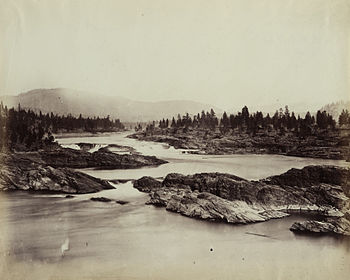Swallowed by the Flood

My writing journey began in the late 1900s after taking a Longridge Writer’s online class for non-fiction. Native history swirled in my heart even before I settled on the reservation with my husband knowing I had some type of Indian in me, little as it is. And after interviewing several elders, I wrote Swallowed by the Flood.
In-tee-tee-huh, (Arrow Lakes tongue), or salmon, had been the major food supply of the American Indians in northeast Washington for centuries. Every spring, large encampments strung out along the riverbanks above the Kettle Falls on the Columbia River 30 miles north of Inchelium, WA. Because the river offered the Natives abundant In-tee-tee-huh, fish were caught, dried, and shared among the people. Consequently, enough salmon were gathered to last until the next seasonIn-tee-tee-huh, (Arrow Lakes tongue), or salmon, had been the major food supply of the American Indians in northeast Washington for centuries. Every spring, large encampments strung out along the riverbanks above the Kettle Falls on the Columbia River 30 miles north of Inchelium, WA. Because the river offered the Natives abundant In-tee-tee-huh, fish were caught, dried, and shared among the people. Consequently, enough salmon were gathered to last until the next season.
In-tee-tee-huh, (Arrow Lakes tongue), or salmon, had been the major food supply of the American Indians in northeast Washington for centuries. Every spring, large encampments strung out along the riverbanks above the Kettle Falls on the Columbia River 30 miles north of Inchelium, WA. Because the river offered the Natives abundant In-tee-tee-huh, fish were caught, dried, and shared among the people. Consequently, enough salmon were gathered to last until the next season.
At that time, harmony dominated the Native people and the land they nurtured until 1930. Talk of a great dam about to be erected at Grand Coulee, WA struck fear and tension reservation wide. The people knew backwater would destroy several towns and historical fishing along the Columbia River, traveling 151 miles upstream. That backwater would later be christened Lake Roosevelt after President Roosevelt.
The grand dam would annihilate a whole lifestyle for many tribes. American Indians from as far as Montana rendezvoused at the plunging falls know to the Indians as Shonitkwu, meaning noisy waters, during the summer months to spear and net salmon too weak to jump the 50-foot falls. The salmon would never again journey to spawn this far north because fish ladders were omitted in the dam’s structure.
Once again, the American Indians of the Colville Tribes would be dislodged. There was no choice, no one asked, and little compensation was rendered. Families and business’ were uprooted. A gushing flood would soon swallow a way of life once familiar.
My husband’s father, grandfather, and great-grandmother, who were of the Arrow Lakes band, lived in Inchelium until the day there were buried. As I research this lost town, I am saddened they are not here to share their stories. I long to learn about the old ways. I search the water, watching their account flow down the river of history. Once alive, now a faint memory.
“People were angry,” said Mrs.Marguerite Lemery Ensminger, an 87-year-old Arrow Lakes elder. We sat in her living room in the summer of 1999 as she recalls the days before life changed for her people. Sorrow etched on her face. “The folks who deserved the money are old or dead,” she says. “They were kids then. The original people never saw a dime.” Her words hung thick in the air as she cast her eyes down at the table from her wheelchair.
To be continued…

Hi Carmen, I understand that this happened to many, including in Arizona, where the San Carlos Apache reservation’s cemetery is now underwater. Another parallel is what happened when the Aswan Dam was built and flooded many very ancient towns and cities in the south and now it seems it is causing all sorts of unintentional problems. I will be interested to read more about this story on your blog.
C.M., I had no idea this also happened in Arizona. Thank you for sharing this with me. Did they move the cemetery to higher ground? I know they did here in Inchelium.
I’m so glad your vocation has taken you to these roots, Carmen. We have all benefited from your extensive research.
Thank you, Mary. I’ve had to just talk to many of the elders. I cannot go to archives as I’m not tribal, which is okay because I think the richness comes from the person.